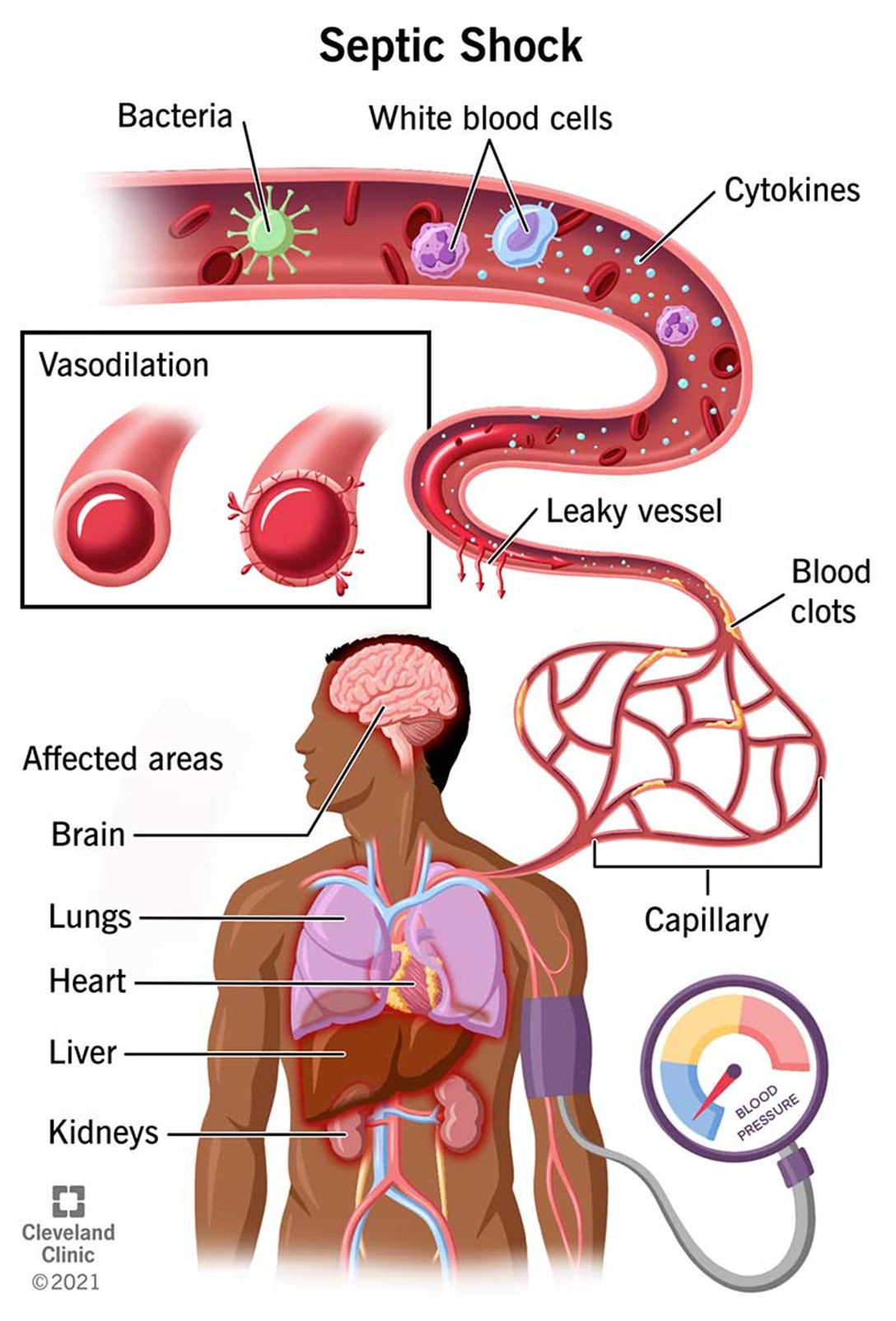A nurse is caring for an adolescent who has been admitted to the PICU with a diagnosis of septic shock. The nurse notes the following :
When planning care for this client, the nurse should anticipate a provider's prescription for which of the following?
Broad-spectrum antibiotics and fluid boluses
Antipyretics and oxygen therapy
Vasopressors and blood transfusions
Corticosteroids and antihistamines
The Correct Answer is A
Choice A reason: Broad-spectrum antibiotics are indicated for septic shock caused by bacterial infection, as they can target a wide range of pathogens and prevent further sepsis. Fluid boluses are also essential to restore the intravascular volume and improve tissue perfusion and oxygenation.

Choice B reason: Antipyretics and oxygen therapy are not sufficient to treat septic shock, as they do not address the underlying infection or the hypovolemia. Antipyretics may lower the temperature, but they do not eliminate the bacteria. Oxygen therapy may improve the pulse oximeter reading, but it does not correct the hypoperfusion.
Choice C reason: Vasopressors and blood transfusions are not the first-line treatments for septic shock, as they may have adverse effects on the cardiovascular system and the coagulation cascade. Vasopressors may increase the blood pressure, but they may also cause vasoconstriction and reduce the blood flow to vital organs. Blood transfusions may increase the hemoglobin level, but they may also increase the risk of fluid overload, hemolysis, and transfusion reactions.
Choice D reason: Corticosteroids and antihistamines are not indicated for septic shock, as they do not have any proven benefits and may have harmful effects on the immune system and the inflammatory response. Corticosteroids may suppress the adrenal function and increase the risk of infection. Antihistamines may cause sedation and dryness of the mucous membranes.
Nursing Test Bank
Naxlex Comprehensive Predictor Exams
Related Questions
Correct Answer is A
Explanation
Choice A reason: This is a contraindication for the MMR immunization, which is a live attenuated vaccine. A child who has a congenital immunodeficiency may not be able to mount an adequate immune response to the vaccine and may be at risk of developing the diseases from the vaccine.
Choice B reason: This is not a contraindication for the MMR immunization. A mild fever after a previous immunization is not a sign of an allergic reaction or a serious adverse effect. The child can still receive the MMR immunization as long as they do not have a moderate or severe illness.
Choice C reason: This is not a contraindication for the MMR immunization. Taking antibiotics for otitis media does not interfere with the effectiveness or safety of the vaccine. The child can still receive the MMR immunization as long as they do not have a moderate or severe illness.
Choice D reason: This is not a contraindication for the MMR immunization. A mild cough and a low-grade fever are not signs of a moderate or severe illness that would prevent the child from receiving the vaccine. The child can still receive the MMR immunization as long as they do not have any other contraindications.
Correct Answer is A
Explanation
Choice A reason: Assess the rest of the child's body for a rash.
The child's red marks across the cheeks are characteristic of fifth disease (also known as erythema infectiosum). Fifth disease is caused by parvovirus B19 and typically presents with a bright red rash on the cheeks, often referred to as "slapped cheek" appearance. The rash may eventually spread to other areas of the body, including the arms, trunk, thighs, and buttocks. It is usually mild and self-limiting.
Choice B reason: This option is not appropriate for a rash caused by fifth disease. There is no indication of child abuse or neglect.
Choice C reason: The rash is due to a viral infection and not related to trauma or injury. Questioning the parents is unnecessary.
Choice D reason: While assessing the child's temperature is important in general nursing care, it is not specifically related to the red marks on the cheeks in this case.
Whether you are a student looking to ace your exams or a practicing nurse seeking to enhance your expertise , our nursing education contents will empower you with the confidence and competence to make a difference in the lives of patients and become a respected leader in the healthcare field.
Visit Naxlex, invest in your future and unlock endless possibilities with our unparalleled nursing education contents today
Report Wrong Answer on the Current Question
Do you disagree with the answer? If yes, what is your expected answer? Explain.
Kindly be descriptive with the issue you are facing.
